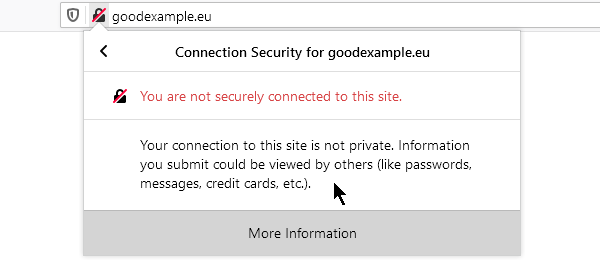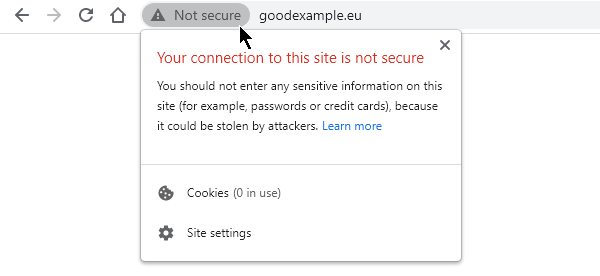Why do I need an SSL certificate for my site? Just the fact that the text "Not secure" in the browser makes site visitors worry about their security is reason enough to equip our site with an SSL certificate and activate a secure HTTPS connection.
But in addition to the peace of mind of users, activating an SSL certificate for the site has several other great benefits.
See what they are, as well as some suggestions for SSL certificates according to the type of site, and brief instructions for activating a secure HTTPS connection.
6 benefits of the SSL certificate for your site and its users
1. Protection of user data through encryption
Protecting user data is just one of the benefits of an SSL certificate. When an SSL certificate is installed for the site, the secure HTTPS connection to it can be activated and used when loading it in the browser. All communication between the user and the site goes through this secure encrypted connection.
Not only is sensitive user data protected (data for login, for means of payment, personal identifying data), but also the history of their browsing on the Internet. Unscrupulous people cannot intercept the data from the communication, nor can they see exactly which site has been visited and which page was loaded.
Without an SSL certificate, every resource and request to the server is over HTTP, which makes them vulnerable to interception and tracking by malicious individuals. And through continuous monitoring it will be possible to establish the history of web browsing, visited sites, pages, articles. It will also be possible to intercept requests and manipulate the resources from the site that are sent to the client.
SSL / TLS certificates are used to protect not only the connection between a visitor and a site, but also in other communications on the Internet. For example, SSL / TLS security can be used when connecting to a mail server, when sending or receiving emails, when connecting to an FTP server, when uploading files to a hosting account, and more.
2. Identity confirmation using the website name(domain name)
SSL certificate issued after Organization Validation or Extended Validation are a very strong indicator of trust. They are a proof of the legitimacy of the identity behind the site name, as well as proof that the visited site is not a fraudulent or phishing site. For the issuance of these certificates, the organization must provide evidence that it has a domain name and that it has a legitimate registration.
When visiting a site that is secured with an OV or EV SSL certificate, users can see the organization's name in the details of the SSL certificate.
Note: For standard DV SSL (Domain Validation) certificates, validation is can be done only with domain ownership. Therefore, such certificates are often used by fraudulent sites because they are very easy to issue.
Would you identify yourself on a site whose owner did not want to be identified in front of you? EV certificates have the highest level of identity validation. With such a certificate, any doubts about the legitimacy of the site and the business behind it disappear.
Check OV SSL certificate data in browsers
The data for the OV SSL certificate in Firefox is visible by clicking on the padlock in the address bar »Connection secure» More information »View certificate (Subject section).
The data for the OV SSL certificate in Chrome is visible by clicking on the padlock in the address bar »Certificate (Valid)» tab Details »Subject field.
Check EV SSL certificate data in browsers
EV SSL certificates have the highest level of identity validation. Only with these certificates the data about the organization are one click away from the user - behind the padlock in the address bar.
The data for the EV SSL certificate in Firefox is visible by clicking on the padlock in the address bar. When you click on the certificate again, additional data for the country and city are visible.
The data for the EV SSL certificate in Chrome is visible by clicking on the padlock in the address bar.
3. Increasing the trust in your site, name, business, quality of the products / services
Having an SSL certificate for the site speaks of the professional attitude and concern of the business for the security of its users' data.
In combination with authentication, the SSL certificate increases the trust of users in your website, name, business and quality of the products / services.
Especially in these times of constant concern about the pandemic environment and the increasing online interaction with business, trust gains a lot of weight in decision-making.
When the site does not have an SSL certificate, the browser shows clear indicators that the connection to it is not secure and that the data can be intercepted by third parties.
When the site does not have an SSL certificate, browsers display a crossed-out padlock or attention sign in the address bar.


4. Increasing consumers, orders, traffic, business benefits
Once users have gained the legitimacy of the site through the SSL certificate, they are more likely to continue interacting with the site.
In online stores, the SSL certificate plays a very important role in the trust and peace of mind of consumers. In the online store they submit their personal data - names, phone number, address, as well as data on payment methods.
5. Signs for better ranking in Google results
The SSL certificate is an SEO advantage of the site compared to the sites that do not have one. For Google, the presence of HTTPS is a sign that can improve the site's ranking in the search results.
For Google, having a secure HTTPS connection to the site is now an industry standard.
This is one of the reasons why Google has removed from its Chrome browser the obvious indicators for secure connection to sites - the green address bar (for EV certificates) and the green color of the padlock. Sites that do not yet have an SSL certificate and therefore have not activated a secure HTTPS connection are now a "deviation" from the norm and users are warned with a "warning" sign and the startling text Not secure.
6. Faster loading with HTTP / 2 protocol (+ TLS 1.3)
The SSL certificate helps to load the site faster. The reason is that only if it is available, the site can use the new and fast HTTP / 2 protocol.
HTTP / 2 is used for site-visitor communication and, unlike previous HTTP, is much faster. Also, the new version of the connection encryption protocol - TLS 1.3 adds additional acceleration and security.
The new version of the TLS 1.3 protocol, which encrypts the connection between a site and a visitor, has an even higher level of security for our data on the Internet.
Three SSL / TLS certificates, according to the type of your website
Add the benefits of the SSL certificate for your site with one of the selected three, depending on the type of site you gave
1. Personal website or blog: DV SSL certificate RapidSSL.
The certificate is issued for one domain. When sensitive user data is not entered on the site, for example in personal site, blog, business card site, budget SSL certificates such as RapidSSL are a great solution. Validation is performed only for domain control (Domain Validation).
2. Company site with separate subdomains for blog, help page and others: OV SSL certificate Sectigo Premium Wildcard.
The OV SSL certificate Sectigo Premium Wildcard is the best budget-oriented offer for securing the site and all its subdomains. Validation is by domain and by organization (Organization Validation). Users will be able to see the data is the organization in the details of the SSL certificate.
3. Online store: EV SSL certificate True BusinessID with EV.
This certificate is issued for one domain. It is suitable for medium and large online stores and sites for which the trust and peace of mind of visitors is very important. Careful verification and validation of the identity behind the site is a sure sign that the organization adheres to the security and trust of its users. The name of the organization is visible with a click on the padlock in the address bar of the browser.
In case users have uploaded some form of login to the site, for example from a link in an email, they can very easily check if they came across the legitimate site, or it is a phishing site just by looking for the presence (and compliance) of the organization's name.
SSL / TLS certificates with extended validation (EV) create the highest level of trust in the site and the business name. They are suitable not only for online stores, but also for banks and financial institutions.
Enable and maintain a secure HTTPS connection for the site
You have selected your SSL certificate. Here's how to activate it for your site in a few steps.
Activation of SSL / TLS certificate and secure HTTPS connection for the site:
- Order an SSL certificate;
- Configure the application for issuing an SSL certificate;
- nstalling the SSL certificate in the hosting account;
- Activation of the SSL certificate and the secure HTTPS connection for the site;
- Clearing insecure HTTP resources on the site;
- Renewal of the SSL certificate (after its period expires, it is reissued: configuration + issuance).
- It is important that you do not miss the renewal of the SSL certificate after its expiration period. Without an active SSL certificate, the site will - be left without a padlock in the browser's address bar and its visitors' data will remain unprotected.
Conclusion
The use of an SSL certificate and a secure HTTPS connection for the site is a clear indication that you care about the trust and security of its visitors. In addition, the benefits of the SSL certificate for the site are very great, some of which - faster loading and better ranking in Google results.

Nadejda Milanova
An experienced Content creator in the field of Search Engine Optimization (SEO) and WordPress. A true proffesional with a Master's degree focused on journalism.
Read more by Nadejda Milanova





